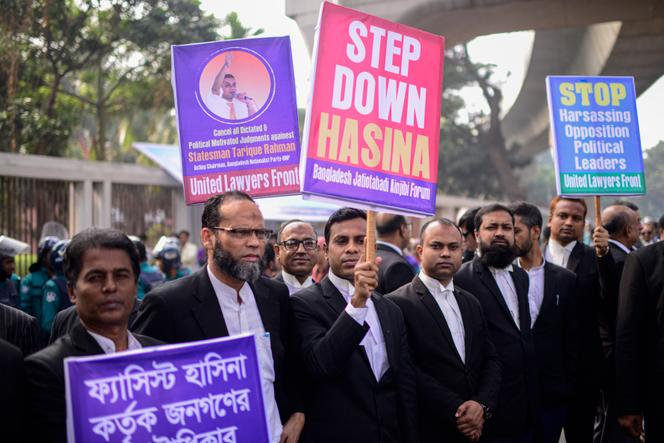


The Dhaka Magistrate's Court is full of members of the Bangladesh Nationalist Party (BNP), the country's main opposition party. On a sunny Monday morning at the end of November, hundreds of them are milling about, accused of vandalism or arson. They are waiting for their bail hearings.
Rashid, an activist, is being prosecuted in 90 cases, Nawab in 36, Rashel (all three gave only their first names) has at least 26 complaints against him, and others have simply stopped counting. The number of defendants seems infinite, the list of charges against them endless. All prefer not to give their surnames for fear of police reprisals. The courts are swamped with political cases. "I can't take it any more," sighed Nahidul Islam, a lawyer who is also a member of the BNP's youth wing. "And tomorrow, I myself have to appear in one of the 60 cases against me," he said, sweating profusely after a hearing.
For months, the BNP has been calling for the resignation of Prime Minister Sheikh Hasina and the dissolution of parliament in favor of a neutral interim government tasked with organizing elections. This provision was previously provided for in the Constitution, but was repealed by Hasina after she came to power in 2009. She has been at the head of the country for nearly 15 years and is preparing to run for a fourth consecutive term in the parliamentary elections on January 7, 2024. Determined not to relinquish power, the "Asian Iron Lady" is waging a relentless crackdown on opponents.
Hasina, the 76-year-old daughter of Sheikh Mujibur Rahman, the founding father of Bangladesh, has plunged the country into authoritarianism. The 2014 elections, which saw a historically low turnout, were boycotted by all opposition parties, allowing the Awami League (AL), the prime minister's party, to win a majority and form a government. The next elections, in 2018, were marred by irregularities. "The day before the elections, ballot boxes were stolen, stuffed and sealed," recalled BNP deputy general secretary Mahbub Uddin Khokon. "During the Awami League's mandate, no election was held in a free and transparent manner," he continued, one of the few high-ranking BNP leaders to have recently been granted bail.
The crackdown on the opposition took a dramatic turn on October 28. On that day, hundreds of thousands of people took to the streets of the capital in response to the BNP's call to express their discontent, fueled in part by soaring inflation approaching 10%, after years of economic success attributed to Hasina. The demonstration turned into a riot and a policeman was killed. The opposition accused the government of orchestrating the violence with the complicity of the security forces in order to justify the ensuing crackdown and put an end to the protests. Awami League militants armed with wooden batons were seen marching behind police officers.
You have 60% of this article left to read. The rest is for subscribers only.
